Sens. James H. Webb Jr. and Chuck Hagel, in their eloquent call for a new GI Bill for today’s veterans, convincingly argue that our troops deserve more educational support than our government provides. The senators, both Vietnam veterans themselves, point out that today’s educational benefits cover only 13 percent of the cost of attending Columbia University and 11 percent for Harvard Law School, effectively excluding many deserving veterans from attending elite institutions.
As a citizen I can only agree. And as an educator who runs a large master’s-level program dedicated to security studies, I believe that the benefits of such an effort would go well beyond the individual soldiers who would receive a better education. Civilians, future administrations, and society as a whole would benefit greatly if more retired and active-duty soldiers went to civilian educational institutions.
Veterans enrich the classroom. Soldiers’ experiences in Iraq, Afghanistan, and elsewhere give them firsthand insight into the questions that are at the heart of a modern university education. For example, in a discussion on humanitarian intervention, several students in my class argued that the only ethical policy choice was to intervene in cases like Darfur, where hundreds of thousands of people have died and even more are at risk. The discussion took on new meaning when one student still in the service dryly noted that it was his ass that would be shot at for someone else’s ethics.
We discussed whether civilians implicated in supporting insurgents could be legitimate targets for U.S. troops’ reprisal. To the surprise of many students, those in uniform almost universally condemned that. Military training had drummed the distinction between combatants and noncombatants into their consciousness, and they prided themselves on understanding and respecting it.
In another class, we examined whether measures like waterboarding should be part of U.S. antiterrorism efforts. Again, many of the officers strongly condemned the practice: They feared that if the United States lowered the bar, they or their comrades would face similar abuse if captured.
Regardless of how one feels about those specific issues, discussions of life-or-death questions are far more real when veterans are in the classroom. At times the discussion becomes personal, but that often brings the complexities home more effectively than any reading I can assign.
Beyond the intellectual perspectives they bring, many of these students are simply more mature. They have seen the world, faced incredible dangers, and had to make decisions that few civilians have had to. That helps other students see the world in a more nuanced manner. One Iraq-war veteran recounted how much he came to admire an insurgent commander whom his unit had fought againstto me, a surprising admission, and one that made me think harder about the challenge the United States faces in Iraq.
Yes, veterans and active-duty soldiers on campuses still party and act out, but they are far more likely to appreciate the wondrous opportunities that a university offers. As a result, they often raise the level of behavior in the classroom and the university as a whole.
While the presence of veterans enriches the classroom, the exchange goes both ways. The military needs to learn about the civilian world. Increasingly the military, particularly the officer corps, is its own world. Soldiers spend much of their lives overseas, and even at home they often live and socialize largely with people in the service. Rather than reduce that isolation, the educational paths of many officers increase it. Cost has led the military to choose in-house educational institutions, such as the Naval War College or the School of Advanced Air and Space Studies. Although many of these programs are superb, officers would benefit from mixing more with civilians, better understanding their perspectives. War, after all, is at its heart an extension of policy. Too often the military forgets that truism.
Gen. David H. Petraeus, the commander of U.S. forces in Iraq, expounded on the benefits to the military of civilian colleges and universities in a recent issue of The American Interest. Petraeus contends that civilian schooling takes officers “out of their intellectual comfort zones,” an experience that English majors forced to take a physics class or engineers required to take art history can easily understand. Equally important, civilian universities provide officers with a reservoir of knowledge on which they can draw during unexpected contingencies. Petraeus, a Princeton Ph.D. himself, recounts how the economics courses he took in graduate school helped him make better decisions in restarting the local economy when he was first deployed to Iraq. It is no coincidence that the accomplishments of Petraeus’s unit were one of the few bright spots in the otherwise dismal record of the early days of the U.S. occupation.
War today requires more practitioners with backgrounds like that of Petraeus. Counterinsurgency and counterterrorism both demand soldiers skilled not just in shooting the enemy, but in rebuilding shattered villages and establishing civic institutions like municipal councils and police forces. Those requirements are not tied exclusively to the post-9/11 world. In the 1990s, the U.S. military engaged in state-building missions in the Balkans, Haiti, Somalia, and elsewhere, all of which demanded a wide range of skills beyond traditional war fighting.
But most important, having more veterans in the classroom helps educate civilians about the military. The professionalization of the services has meant that many segments of the American population, particularly among the educated civilian elite, rarely interact with the military in any capacity. Many students’ knowledge of the military comes only from the movies. Even more troubling, many professors harbor stereotypes about the military, not recognizing the diversity of opinion within military circles on many issues and the remarkable minds of many young soldiers. That gap is dangerous for society, as wars can occur that do not engage the nation as a whole. The result is a growing divide, where a small part of the nation pays the price for the decisions of the majority of citizens who simply go about their lives with little change.
Private colleges are perhaps most vulnerable. Cost makes many of them prohibitive to veterans who do not have additional financial support. (The efforts of people like Dartmouth’s President James Wright, himself a veteran, who initiated a program to help wounded veterans go to Dartmouth, are commendable exceptions.)
The access gap is a particular concern for me, as I teach civilian students who are to be the next generation of policy makers on national security. They need to understand both the strengths and limits of the military. If they retain a cartoonish view of it, they will make disastrous decisions when in power. I particularly hope that their daily interactions with military personnel will change their perspective on war. The use of force is sometimes necessary, but it is an instrument to be used sparingly. Knowing your friends will risk their lives is a salutary reminder of the need to be prudent in defense of the nation.


Commentary
Op-edVeterans and Colleges Have a Lot to Offer Each Other
December 11, 2007